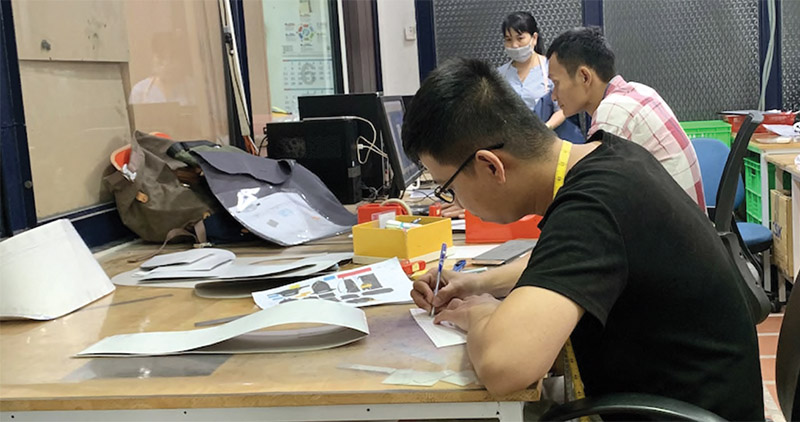How high do Vietnamese goods fly thanks to Amazon?
The number of Vietnamese sellers on Amazon has increased fourfold in the past five years since Amazon entered Vietnam, of which the number of sellers with sales of over $1 million per year has increased tenfold. Vietnamese businesses also rely on their reputation on Amazon to return to conquer the domestic market. However, the process of conquering the domestic and foreign markets are two completely opposite problems.
For businesses participating in e-commerce platforms, successfully conquering both domestic and foreign markets is not easy.
Building a brand on Amazon
In 2021, Kada International Joint Stock Company, a backpack and handbag manufacturing and processing company headquartered in Ho Chi Minh City, opened an account on Amazon. At the time of Covid-19, Kada's Amazon was just approved. It took nearly two years, until April 2024, for Kada to complete its trademark registration in the US.
Mr. Le Van Hoang, Director of Kada, said that Kada is confident that the product lines will soon appear on Amazon and sell well. Because the products are made from recycled nylon fibers, the design and sewing team was trained in Japan and Kada has processed for famous brands such as Carhatt, The North Face, Lesportsac...

Kada is manufacturing backpacks and handbags for many global fashion brands.
Photo: Le Hoang
From a manufacturer, even though it has produced goods for famous global brands, to having a private brand registered and doing business on the global e-commerce platform is a long story. Ms. Le Thi Khanh Ha, Director of External Affairs and Communications of Amazon Global Selling Vietnam, said that many Vietnamese businesses want to go to Amazon, but everyone is afraid of the complicated and time-consuming procedures of Amazon compared to domestic platforms such as Lazada, Shopee...
“Amazon’s steps and timeframe are all available and very clear. The rest, when to go public and start a business depends on the determination of the business,” said Ms. Khanh Ha.
To be listed on Amazon, goods must be cleared through customs and enter the FBA warehouse (Amazon's fulfillment center in the US), businesses must obtain many certificates. For example, they must have certification from the US Food and Drug Administration (FDA) for agricultural and food products, sustainable forest management certification (FSC) for raw materials and wooden furniture... Products must meet safety standards in the consumer market, have international standard codes and barcodes, and register their brands on Amazon to use barcodes... With such strict regulations, only about 20% of businesses can open their own accounts on Amazon.
Back to branding on Amazon.
Amazon Global Selling Vietnam CEO Gijae Song told Saigon Economics that Vietnamese retailers on Amazon can be divided into two groups.
“One is those who have sold online, are quick to catch up with online sales trends and have sales skills, but lack creativity and a long-term plan to build a brand. They follow their instincts, like best-selling products that are profitable in the Vietnamese market, then bring them to the market exactly the same and expect the same results.
The second group is the group of manufacturers and brand owners who have real production capacity and experience in selling to businesses (B2B), but do not know how to build an online brand or sell to retail customers (B2C). They are not quick to grasp trends and satisfy international buyers, especially retail customers, because they are used to selling wholesale.
Mr. Gijae Song said that selling on Amazon helps businesses improve their branding capabilities and expand business opportunities. For example, many Vietnamese businesses manufacture goods for Ikea and other global furniture brands, so they do not have their own brands. However, by taking advantage of the uniqueness of raw materials and prices, and solving logistics problems, Vietnamese businesses have begun to produce larger items, instead of small items as before. Then, from indoor furniture, Vietnamese businesses have also begun to produce outdoor items and expand market opportunities.
Just touched 1% potential
E-commerce in Vietnam has grown at a rate of 20-25% per year for many years, according to data from the Department of E-commerce and Digital Economy under the Ministry of Industry and Trade. However, the growth rate of cross-border e-commerce or online exports from Vietnam through platforms such as Amazon, Alibaba or eBay is twice this rate.
A survey conducted by AlphaBeta in 2023 showed that 88% of Vietnamese enterprises are aware of the importance of e-commerce for their export capacity. However, the number of Vietnamese enterprises that actually exploit global platforms like Amazon is still small. Mr. Gijae Song said that Vietnam's annual export turnover is about 370 billion USD, but online exports through platforms like Amazon currently account for only about 1%. "The potential is still huge," Mr. Song said at a forum on May 24 in Ho Chi Minh City.
In its five years in Vietnam, Amazon has made great strides. The number of sellers using FBA fulfillment centers and the number of orders sold on Amazon increased by 300%, or four times, with 17 million Vietnamese products sold on Amazon last year. The number of sellers earning over $1 million in revenue per year on Amazon increased 10-fold in the past five years. The five most popular product categories in Vietnam on Amazon include health and personal care, beauty, home, kitchen, and apparel.
So what are the similarities and differences in online exporting on Amazon between Vietnam and another Asian country, such as Korea, in the early stages of Amazon's presence in the market?
Amazon representatives did not respond directly to questions. But Le Thi Khanh Ha said that K-food and K-beauty products are strengths of Korean retailers on Amazon. “Beauty and health care products from Vietnam also catch the trend of Western customers preferring products with natural ingredients and origins… Some businesses have achieved annual sales of over 1 million dollars,” said Khanh Ha.
Up to now, Vietnamese retailers have only implemented the customer sales model (B2C or DTC), and have not been able to implement the B2B wholesale model like Amazon is implementing in China. If they can do the same, it will open the door to the market, helping online exports increase sharply from the small 1% mentioned above.
However, Mr. Gijae Song emphasized: “To reach out to the big sea, sellers need to answer three questions. One is whether they are agile enough and dynamic enough. Two is whether the seller has taken full advantage of the data and tools provided by the platform to understand international consumers. Finally, has the business seriously invested and has enough vision?”
Return to conquer the home market
Having reached over $1 million in sales in its first year on Amazon last year, Apera - the natural cosmetics startup of two young men, Dong Thanh Son and Hoang Quoc Vinh - is looking to reach out to the home market.
The special treatment product strategy has really helped Apera succeed in the foreign market. Users often have many problems at the same time such as acne and dark spots, unsightly scars, stretch marks in pregnant women, dark spots and eye bags, sparse eyelashes and eyebrows, plaque on teeth... Instead of offering products with two, three or more uses, 2 in 1 or 3 in 1 style, Apera chooses a specialized direction, specifically treating each problem such as acne, dark spots, melasma, scars...
Abera uses natural, safe domestic ingredients for products on Amazon such as ginseng, turmeric, red pomegranate, green coffee beans, red reishi mushrooms, shea butter, black ginger, pearl powder, pine cone essence... Reasonable prices are the advantages of Apera product lines.
Vietnamese brands that have become famous on Amazon can force consumers to have a different view of Vietnamese products. From strong brands like Minh Long ceramics or Sunhouse household appliances, to lesser-known brands like BeeFurni that has grown from processing to becoming a brand of outdoor wooden furniture, to straws made from sedge, sugarcane, and coffee from Equo...
But domestic market trends and tastes can be a big challenge for everyone. That is, copying a product that sells well and is profitable in the US market does not guarantee success in the domestic market, as Mr. Gijae Song said in an interview with Saigon Economics.
Thuy Linh


